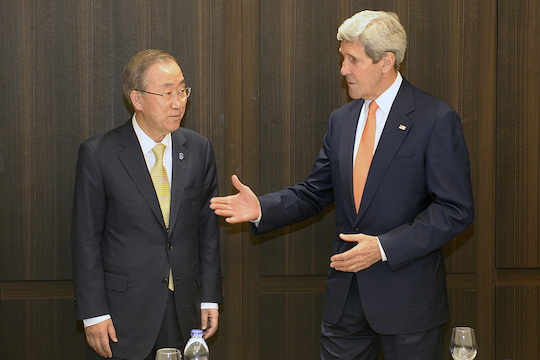The bickering between countries over who has the right to negotiate over the Palestinians is nothing new. We’ve been here before.
By Aziz Abu Sarah and Dr. Marc Gopin
There are two main camps involved in negotiating a ceasefire agreement between Hamas and Israel. However, the players are not within the camp that most would have expected. What started as Israel vs. Hamas is quickly becoming a geopolitical issue involving many new actors. While this might seem good for some, it should be seen as terrible news for Palestinians and Israelis alike.
Israel, Egypt and the PLO seem to be in one camp supporting the Egyptian ceasefire proposal, and Saudi Arabia might be there as well. That camp calls for an immediate ceasefire and for all issues to be negotiated in Egypt after the ceasefire is achieved. In the other camp stands Hamas, Qatar and Turkey. They oppose the Egyptian ceasefire because it does not address the blockade on Gaza.

There is a third camp that includes U.S. Secretary of State John Kerry and some other international figures, who are trying to figure out how to bring these two camps to agree on one formula for a ceasefire, but are managing to get everyone angry instead. Complicating things is a reported $11 billion defense deal between the United States and Qatar, which prompts some to question what’s going on in terms of everyone’s interests.
The problem with these new alignments is that Hamas vs. Israel is now becoming a geopolitical conflict that includes countries that have become bitter enemies. Qatar and Turkey’s support for the Muslim Brotherhood in Egypt, and the opposition to Sisi, the current Egyptian president, is positioning them on the rejectionist side of any proposal that Egypt would propose. Egypt, on the other hand, does not want Qatar or Turkey to have any regional influence on its borders – certainly not in Gaza. Sisi’s strategy has been to pressure Hamas to accept his proposal by limiting aid coming from other Arab countries, such as the Tunisian aid that was not allowed into Gaza last week. However, Egypt marginalized Hamas to a point of complete mistrust when it did not speak to its leaders directly about the first ceasefire proposal.
Secretary Kerry’s efforts have not lead to any concrete agreements yet. According to Haaretz writer Barak Ravid, the Israeli government was shocked by his ceasefire proposal. According to Ma’an News Agency, the PLO was furious that Kerry would undermine the Egyptian proposal and side with the Turkish-Qatari proposal.
The bickering between the Arab and Muslim states over who has the right to negotiate over the Palestinians is nothing new. Palestinians have paid the price for the Arab and Muslim geopolitical infighting for decades. Unfortunately, some Palestinian leaders are allowing the Palestinian case to be used in this geopolitical fight.
We have seen this movie before. Some of the same players involved in “helping” Gaza are also involved in Syria. Different proposals, never-ending talks and negotiations. The end of the matter is that regional interests trump the Syrian interest for most of these countries. Three years on Syria is divided, broken in small “states,” with over 160,000 killed and millions displaced or made refugees. All the promises for support faded away. Syrian civilians are the ones who paid the price.
Click here for +972′s full coverage of the war in Gaza
Today this same is happening in Gaza. ISIL, the Islamic State of Iraq and Levant, is already reported to have a presence in Gaza and is likely to try to take power from Hamas. While all the other regional powers are arguing about which “proposal” for a ceasefire should be accepted, more than 1,040 Palestinians have been killed and 6,000 injured, with 44 Israelis killed as well. If this conflict continues with the same intensity for 12 months, there will be 24,000 Palestinian killed with 72,000 injured. Gaza today lies in ruins, and more than 170,000 have been made homeless. It will take years to rebuild what was destroyed in two weeks.
Hopefully, a ceasefire will be finalized soon and the regional powers will stop playing with Palestinian lives for their own political self-interests. But let’s remember that the ceasefire will not end the Israeli-Palestinian conflict. Perhaps the main problem with the ceasefire negotiations is that they ignore the underlying issues. While a ceasefire will allow Israelis to slip back into normal lives, it will keep Palestinians under occupation both in Gaza and the West Bank.
It also ignores that the next generation is comprised of children who have seen three wars in six years. Kids in Gaza only know Israelis from the destruction of their cities, and the deaths of their family members. Kids in Israel only know Palestinians from the sound of sirens. So, unless we change course, we can expect a similarly ugly confrontations very soon.
Marc Gopin is the James Laue Professor of World Religions, Diplomacy and Conflict Resolution at George Mason University in Washington D.C. He is also the co-founder of MEJDI Tours.
Related:
Obama calls on Netanyahu to accept unconditional humanitarian ceasefire; 15 killed in Gaza
PHOTOS: Gazans use ‘ceasefire’ to pick up the pieces


